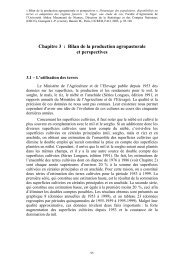- Page 1:
WATERING THE NEIGHBOUR’S GARDEN:
- Page 4 and 5:
Chapters in this volume originate f
- Page 7 and 8:
List of Authors Sutapa AGRAWAL is P
- Page 9 and 10:
Foreword The rampant demographic ma
- Page 11 and 12:
TABLE OF CONTENTS Introduction Isab
- Page 13 and 14:
Introduction Isabelle ATTANÉ and C
- Page 15 and 16:
INTRODUCTION 3 point to an unexpect
- Page 17 and 18:
INTRODUCTION 5 women to avoid unwan
- Page 19 and 20:
INTRODUCTION 7 to estimate the cont
- Page 21 and 22:
INTRODUCTION 9 a feature common amo
- Page 23 and 24:
INTRODUCTION 11 women and may in tu
- Page 25 and 26:
INTRODUCTION 13 covering other regi
- Page 27 and 28:
INTRODUCTION 15 ratio at birth. Tha
- Page 29 and 30:
INTRODUCTION 17 Figure 2 Research l
- Page 31 and 32:
INTRODUCTION 19 This is no doubt an
- Page 33 and 34:
INTRODUCTION 21 References ATTANÉ
- Page 35:
Part I RECENT TRENDS IN SEX RATIO I
- Page 38 and 39:
26 LI S.-WEI Y.- JIANG Q. - M. W. F
- Page 40 and 41:
28 LI S.-WEI Y.- JIANG Q. - M. W. F
- Page 42 and 43:
30 LI S.-WEI Y.- JIANG Q. - M. W. F
- Page 44 and 45:
32 LI S.-WEI Y.- JIANG Q. - M. W. F
- Page 46 and 47:
34 LI S.-WEI Y.- JIANG Q. - M. W. F
- Page 48 and 49:
36 LI S.-WEI Y.- JIANG Q. - M. W. F
- Page 50 and 51:
38 LI S.-WEI Y.- JIANG Q. - M. W. F
- Page 52 and 53:
40 LI S.-WEI Y.- JIANG Q. - M. W. F
- Page 54 and 55:
42 LI S.-WEI Y.- JIANG Q. - M. W. F
- Page 56 and 57:
44 LI S.-WEI Y.- JIANG Q. - M. W. F
- Page 58 and 59:
46 LI S.-WEI Y.- JIANG Q. - M. W. F
- Page 61 and 62:
Sex Ratio at Birth and Excess Femal
- Page 63 and 64:
SEX RATIO AT BIRTH AND EXCESS FEMAL
- Page 65 and 66:
SEX RATIO AT BIRTH AND EXCESS FEMAL
- Page 67 and 68:
SEX RATIO AT BIRTH AND EXCESS FEMAL
- Page 69 and 70:
SEX RATIO AT BIRTH AND EXCESS FEMAL
- Page 71 and 72:
SEX RATIO AT BIRTH AND EXCESS FEMAL
- Page 73 and 74:
SEX RATIO AT BIRTH AND EXCESS FEMAL
- Page 75 and 76:
SEX RATIO AT BIRTH AND EXCESS FEMAL
- Page 77 and 78:
SEX RATIO AT BIRTH AND EXCESS FEMAL
- Page 79 and 80:
SEX RATIO AT BIRTH AND EXCESS FEMAL
- Page 81 and 82:
SEX RATIO AT BIRTH AND EXCESS FEMAL
- Page 83 and 84:
SEX RATIO AT BIRTH AND EXCESS FEMAL
- Page 85 and 86:
A Sharp Increase in Sex Ratio at Bi
- Page 87 and 88:
A SHARP INCREASE IN SEX RATIO AT BI
- Page 89 and 90:
A SHARP INCREASE IN SEX RATIO AT BI
- Page 91 and 92:
A SHARP INCREASE IN SEX RATIO AT BI
- Page 93 and 94:
A SHARP INCREASE IN SEX RATIO AT BI
- Page 95 and 96:
A SHARP INCREASE IN SEX RATIO AT BI
- Page 97 and 98:
A SHARP INCREASE IN SEX RATIO AT BI
- Page 99 and 100:
A SHARP INCREASE IN SEX RATIO AT BI
- Page 101 and 102:
Son Preference, Female Deficit and
- Page 103 and 104:
SON PREFERENCE, FEMALE DEFICIT… 2
- Page 105 and 106:
SON PREFERENCE, FEMALE DEFICIT… e
- Page 107 and 108:
SON PREFERENCE, FEMALE DEFICIT… F
- Page 109 and 110:
SON PREFERENCE, FEMALE DEFICIT… A
- Page 111 and 112:
SON PREFERENCE, FEMALE DEFICIT… b
- Page 113 and 114:
SON PREFERENCE, FEMALE DEFICIT… e
- Page 115 and 116:
SON PREFERENCE, FEMALE DEFICIT… r
- Page 117 and 118:
SON PREFERENCE, FEMALE DEFICIT… R
- Page 119:
Part II DIFFERENTIALS IN DISCRIMINA
- Page 122 and 123:
110 C.Z. GUILMOTO - I. ATTANÉ gap
- Page 124 and 125:
112 C.Z. GUILMOTO - I. ATTANÉ rise
- Page 126 and 127:
114 C.Z. GUILMOTO - I. ATTANÉ only
- Page 128 and 129:
116 C.Z. GUILMOTO - I. ATTANÉ adva
- Page 130 and 131:
118 C.Z. GUILMOTO - I. ATTANÉ nomi
- Page 132 and 133:
120 C.Z. GUILMOTO - I. ATTANÉ chil
- Page 134 and 135:
122 C.Z. GUILMOTO - I. ATTANÉ Figu
- Page 136 and 137:
124 C.Z. GUILMOTO - I. ATTANÉ incr
- Page 138 and 139:
126 C.Z. GUILMOTO - I. ATTANÉ itse
- Page 140 and 141:
128 C.Z. GUILMOTO - I. ATTANÉ patr
- Page 143 and 144:
1. Introduction Factors Influencing
- Page 145 and 146:
FACTORS INFLUENCING THE USE OF PREN
- Page 147 and 148:
FACTORS INFLUENCING THE USE OF PREN
- Page 149 and 150:
FACTORS INFLUENCING THE USE OF PREN
- Page 151 and 152:
FACTORS INFLUENCING THE USE OF PREN
- Page 153 and 154:
FACTORS INFLUENCING THE USE OF PREN
- Page 155 and 156:
FACTORS INFLUENCING THE USE OF PREN
- Page 157 and 158:
FACTORS INFLUENCING THE USE OF PREN
- Page 159 and 160:
FACTORS INFLUENCING THE USE OF PREN
- Page 161 and 162:
FACTORS INFLUENCING THE USE OF PREN
- Page 163 and 164:
FACTORS INFLUENCING THE USE OF PREN
- Page 165 and 166:
FACTORS INFLUENCING THE USE OF PREN
- Page 167 and 168:
FACTORS INFLUENCING THE USE OF PREN
- Page 169 and 170:
FACTORS INFLUENCING THE USE OF PREN
- Page 171 and 172:
FACTORS INFLUENCING THE USE OF PREN
- Page 173 and 174:
Decreases in Male and Female Mortal
- Page 175 and 176:
DECREASES IN MALE AND FEMALE MORTAL
- Page 177 and 178:
DECREASES IN MALE AND FEMALE MORTAL
- Page 179 and 180:
DECREASES IN MALE AND FEMALE MORTAL
- Page 181 and 182:
DECREASES IN MALE AND FEMALE MORTAL
- Page 183 and 184:
DECREASES IN MALE AND FEMALE MORTAL
- Page 185 and 186:
DECREASES IN MALE AND FEMALE MORTAL
- Page 187 and 188:
DECREASES IN MALE AND FEMALE MORTAL
- Page 189 and 190:
DECREASES IN MALE AND FEMALE MORTAL
- Page 191 and 192:
DECREASES IN MALE AND FEMALE MORTAL
- Page 193:
DECREASES IN MALE AND FEMALE MORTAL
- Page 196 and 197:
184 KIM D.S. -SONG Y.J. birth at hi
- Page 198 and 199:
186 KIM D.S. -SONG Y.J. trance exam
- Page 200 and 201:
188 KIM D.S. -SONG Y.J. and on its
- Page 202 and 203:
190 KIM D.S. -SONG Y.J. striking. W
- Page 204 and 205:
192 KIM D.S. -SONG Y.J. Table 1 Sex
- Page 206 and 207:
194 KIM D.S. -SONG Y.J. maintained
- Page 208 and 209:
196 KIM D.S. -SONG Y.J. ritual is t
- Page 210 and 211:
198 KIM D.S. -SONG Y.J. and educati
- Page 212 and 213:
200 KIM D.S. -SONG Y.J. dents in ea
- Page 214 and 215:
202 KIM D.S. -SONG Y.J. behaviour i
- Page 217:
Part III LOCAL PERSPECTIVES ON GEND
- Page 220 and 221:
208 L. BOSSEN to support their husb
- Page 222 and 223:
210 L. BOSSEN The period of rural c
- Page 224 and 225:
212 L. BOSSEN throughout their live
- Page 226 and 227:
214 Figure 1 County sex ratio by bi
- Page 228 and 229:
216 L. BOSSEN The local demand for
- Page 230 and 231:
218 Table 3 Huang Tu Village change
- Page 232 and 233:
220 L. BOSSEN lineage which has the
- Page 234 and 235:
222 L. BOSSEN outside the patriline
- Page 236 and 237:
224 L. BOSSEN officials have not ye
- Page 238 and 239:
226 L. BOSSEN to households in its
- Page 240 and 241:
228 L. BOSSEN LI Shuzuo, FELDMAN Ma
- Page 242 and 243:
230 WU H. -M. FELDMAN -JIN X. -LI S
- Page 244 and 245:
232 WU H. -M. FELDMAN -JIN X. -LI S
- Page 246 and 247:
234 WU H. -M. FELDMAN -JIN X. -LI S
- Page 248 and 249:
236 WU H. -M. FELDMAN -JIN X. -LI S
- Page 250 and 251:
238 WU H. -M. FELDMAN -JIN X. -LI S
- Page 252 and 253:
240 WU H. -M. FELDMAN -JIN X. -LI S
- Page 254 and 255:
242 WU H. -M. FELDMAN -JIN X. -LI S
- Page 256 and 257:
244 WU H. -M. FELDMAN -JIN X. -LI S
- Page 259 and 260:
Discrimination from Conception to C
- Page 261 and 262: DISCRIMINATION FROM CONCEPTION TO C
- Page 263 and 264: DISCRIMINATION FROM CONCEPTION TO C
- Page 265 and 266: DISCRIMINATION FROM CONCEPTION TO C
- Page 267 and 268: DISCRIMINATION FROM CONCEPTION TO C
- Page 269 and 270: DISCRIMINATION FROM CONCEPTION TO C
- Page 271 and 272: DISCRIMINATION FROM CONCEPTION TO C
- Page 273 and 274: DISCRIMINATION FROM CONCEPTION TO C
- Page 275 and 276: DISCRIMINATION FROM CONCEPTION TO C
- Page 277 and 278: DISCRIMINATION FROM CONCEPTION TO C
- Page 279 and 280: Is Son Preference Emerging among th
- Page 281 and 282: IS SON PREFERENCE EMERGING AMONG TH
- Page 283 and 284: IS SON PREFERENCE EMERGING AMONG TH
- Page 285 and 286: IS SON PREFERENCE EMERGING AMONG TH
- Page 287 and 288: IS SON PREFERENCE EMERGING AMONG TH
- Page 289 and 290: IS SON PREFERENCE EMERGING AMONG TH
- Page 291 and 292: IS SON PREFERENCE EMERGING AMONG TH
- Page 293 and 294: IS SON PREFERENCE EMERGING AMONG TH
- Page 295 and 296: IS SON PREFERENCE EMERGING AMONG TH
- Page 297 and 298: IS SON PREFERENCE EMERGING AMONG TH
- Page 299 and 300: IS SON PREFERENCE EMERGING AMONG TH
- Page 301 and 302: IS SON PREFERENCE EMERGING AMONG TH
- Page 303 and 304: IS SON PREFERENCE EMERGING AMONG TH
- Page 305 and 306: IS SON PREFERENCE EMERGING AMONG TH
- Page 307 and 308: Vulnerable Daughters in a Modernizi
- Page 309 and 310: VULNERABLE DAUGHTERS IN A MODERNIZI
- Page 311: VULNERABLE DAUGHTERS IN A MODERNIZI
- Page 315 and 316: VULNERABLE DAUGHTERS IN A MODERNIZI
- Page 317 and 318: VULNERABLE DAUGHTERS IN A MODERNIZI
- Page 319 and 320: VULNERABLE DAUGHTERS IN A MODERNIZI
- Page 321 and 322: VULNERABLE DAUGHTERS IN A MODERNIZI
- Page 323 and 324: VULNERABLE DAUGHTERS IN A MODERNIZI
- Page 325 and 326: VULNERABLE DAUGHTERS IN A MODERNIZI
- Page 327 and 328: VULNERABLE DAUGHTERS IN A MODERNIZI
- Page 329 and 330: VULNERABLE DAUGHTERS IN A MODERNIZI
- Page 331 and 332: VULNERABLE DAUGHTERS IN A MODERNIZI
- Page 333 and 334: VULNERABLE DAUGHTERS IN A MODERNIZI
- Page 335: VULNERABLE DAUGHTERS IN A MODERNIZI
- Page 339 and 340: Interventions to Balance Sex Ratio
- Page 341 and 342: INTERVENTIONS TO BALANCE SEX RATIO
- Page 343 and 344: INTERVENTIONS TO BALANCE SEX RATIO
- Page 345 and 346: INTERVENTIONS TO BALANCE SEX RATIO
- Page 347 and 348: INTERVENTIONS TO BALANCE SEX RATIO
- Page 349 and 350: INTERVENTIONS TO BALANCE SEX RATIO
- Page 351 and 352: INTERVENTIONS TO BALANCE SEX RATIO
- Page 353 and 354: INTERVENTIONS TO BALANCE SEX RATIO
- Page 355 and 356: INTERVENTIONS TO BALANCE SEX RATIO
- Page 357 and 358: INTERVENTIONS TO BALANCE SEX RATIO
- Page 359 and 360: Son Preference and the Marriage Squ
- Page 361 and 362: SON PREFERENCE AND THE MARRIAGE SQU
- Page 363 and 364:
SON PREFERENCE AND THE MARRIAGE SQU
- Page 365 and 366:
SON PREFERENCE AND THE MARRIAGE SQU
- Page 367 and 368:
SON PREFERENCE AND THE MARRIAGE SQU
- Page 369 and 370:
SON PREFERENCE AND THE MARRIAGE SQU
- Page 371 and 372:
SON PREFERENCE AND THE MARRIAGE SQU
- Page 373 and 374:
SON PREFERENCE AND THE MARRIAGE SQU
- Page 375:
SON PREFERENCE AND THE MARRIAGE SQU
- Page 378 and 379:
366 G. HUGO -NGUYEN THI H. X. front
- Page 380 and 381:
368 G. HUGO -NGUYEN THI H. X. and s
- Page 382 and 383:
370 G. HUGO -NGUYEN THI H. X. Only
- Page 384 and 385:
372 G. HUGO -NGUYEN THI H. X. domin
- Page 386 and 387:
374 G. HUGO -NGUYEN THI H. X. wives
- Page 388 and 389:
376 G. HUGO -NGUYEN THI H. X. wan;
- Page 390 and 391:
378 G. HUGO -NGUYEN THI H. X. Minh
- Page 392 and 393:
380 G. HUGO -NGUYEN THI H. X. were
- Page 394 and 395:
382 G. HUGO -NGUYEN THI H. X. Table
- Page 396 and 397:
384 G. HUGO -NGUYEN THI H. X. this
- Page 398 and 399:
386 G. HUGO -NGUYEN THI H. X. there
- Page 400 and 401:
388 G. HUGO -NGUYEN THI H. X. “ M
- Page 402 and 403:
390 G. HUGO -NGUYEN THI H. X. HUANG
- Page 405 and 406:
Transnational Migration, Marriage a
- Page 407 and 408:
TRANSNATIONAL MIGRATION, MARRIAGE A
- Page 409 and 410:
TRANSNATIONAL MIGRATION, MARRIAGE A
- Page 411 and 412:
TRANSNATIONAL MIGRATION, MARRIAGE A
- Page 413 and 414:
TRANSNATIONAL MIGRATION, MARRIAGE A
- Page 415 and 416:
TRANSNATIONAL MIGRATION, MARRIAGE A
- Page 417 and 418:
TRANSNATIONAL MIGRATION, MARRIAGE A
- Page 419 and 420:
TRANSNATIONAL MIGRATION, MARRIAGE A
- Page 421 and 422:
TRANSNATIONAL MIGRATION, MARRIAGE A
- Page 423 and 424:
TRANSNATIONAL MIGRATION, MARRIAGE A
- Page 425 and 426:
TRANSNATIONAL MIGRATION, MARRIAGE A
- Page 427 and 428:
TRANSNATIONAL MIGRATION, MARRIAGE A
- Page 429 and 430:
TRANSNATIONAL MIGRATION, MARRIAGE A
- Page 431 and 432:
TRANSNATIONAL MIGRATION, MARRIAGE A
- Page 433 and 434:
TRANSNATIONAL MIGRATION, MARRIAGE A
- Page 435 and 436:
TRANSNATIONAL MIGRATION, MARRIAGE A
- Page 437:
TRANSNATIONAL MIGRATION, MARRIAGE A










